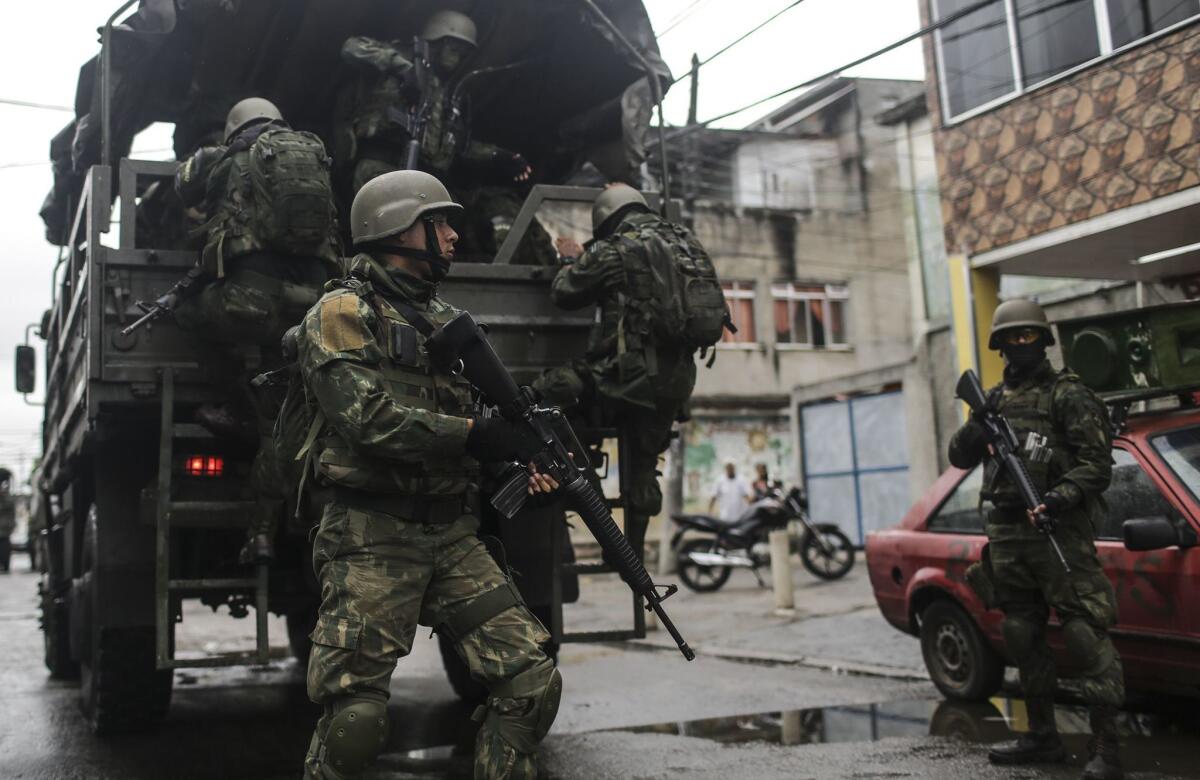Brazil called up the military to control violence in Rio de Janeiro. Since then, it’s only gotten worse

- Share via
“Shots fired in Fazendinha and Zona do Medo, in Complexo do Alemão (16:25).”
“Police operation in the São Joaquim neighborhood in Itaboraí ended with one dead this morning.”
“Shots fired in the Cação neighborhood in Itaguaí (13:45).”
“Shots fired in Vila Kennedy, nearby Barão. (6:30).”
Just 10 days after Brazilian President Michel Temer signed a decree handing the military control of public security in Rio de Janeiro, notifications like these continue to fill the screens of smartphones across the surrounding state, informing those who have downloaded the Crossfire app (Fogo Cruzado in Portuguese) of when and where shootouts and gunshots are heard. Most live in Rio’s innumerable favelas, where police—and now military—operations have become an everyday occurrence.
In the week and a half that the military has been in control, the number of shootouts and shots fired, as well as deaths from those gunshots, have risen significantly. From Feb. 17 to Monday at 6 p.m. local time, the app registered 238 occurrences, 49 deaths and 38 injuries. In the 10 days before that, those numbers were 113, 12 and 24, according to the app’s reports.
Launched by Amnesty International in 2016, the app has been run by an independent think tank, Instituto Update, since January. Its team collects information from users via the app, as well as direct messages on Facebook, Twitter and WhatsApp, before adding any details provided in media and police reports.
As violence in Rio continues to make headlines, the real-time information shared through the app has become essential to residents.
“I was heading there… changing my plans,” tweeted Marconi Alves, a salesman who regularly visits clients all over Rio. He was responding to a Crossfire notification on Twitter that streets were blocked off for a police operation.
While not official—February numbers from the state government’s Public Security Institute are due in March—data collected by Crossfire are considered highly accurate. The app not only gives crucial information regarding violence in Rio for those who live there, but also provides a bigger-picture perspective for those looking to change the way the state is governed.
“Users activate their GPS and receive real-time alerts on shootouts and gunshots around them, and also on the impact of gun violence, like road and school closures,” said Cecilia Olliveira, creator and data manager of the app. “On the other hand, the data collected can be used to construct more effective public policies, since the diagnosis of each situation is immediate, with geolocation that can be cross-referenced with other indicators.”
Rio de Janeiro — which is the name of both the city and the state it dominates — is scrambling to find a better way to deal with public security. Rampant government corruption and a disastrous economy have only exacerbated the crime problem.
While the federal government launched a national security plan in January 2017 in response to massacres in several prisons across the country and violence on its streets, the plan didn’t begin in Rio until August. The plan provided money to build 26 state and five federal prisons nationwide, and to modernize the Rio prison system and combat organized crime. It also called for deploying the military when necessary.
Despite those efforts, the Public Security Institute registered 6,731 homicides in Rio in 2017, the highest number since 2009.
Gen. Walter Souza Braga Netto, who has been named Rio’s intervener, now controls the state’s civil and military police, as well as troops that have been charged with augmenting them.
Last year, soldiers were sent to patrol the streets of Rio twice under another initiative, known as the Guarantee of Law and Order. The second time, in July, the order was put in place as families of police officers protested the increasing number of officer deaths, unpaid salaries and a lack of safe working conditions.
Now, under Netto’s command, troops are already being criticized. On Feb. 23, soldiers were seen checking IDs and photographing residents in three of Rio’s west-end favelas in what they said was a legal and routine operation. Local journalists said they were told they were getting in the way of the troops’ work and were removed from the area where the registration was taking place, and residents weren’t allowed to leave the favelas until they had been registered.
Rio de Janeiro’s Bar Assn., which created a legal observatory committee to go along with the federal intervention in the state, is demanding an explanation for what it said appears to be an unconstitutional collection of information.
In one of the favelas, Vila Kennedy, the registration process startled many residents, but some said they were in favor of the federal intervention, which they hoped would help rid their neighborhood of drug trafficking and violence, as well as the need for apps like Crossfire.
“I wasn’t registered, but I would have absolutely no problem with it,” said one resident, who gave only her first name, Kátia, out of fear of retaliation from drug traffickers in her neighborhood. She said she was pulled over by troops who asked to see her ID and vehicle registration, but didn’t take her photo. “We have to believe the intervention will help. We’ve had enough.”
Langlois is a special correspondent.
Sign up for Essential California
The most important California stories and recommendations in your inbox every morning.
You may occasionally receive promotional content from the Los Angeles Times.







